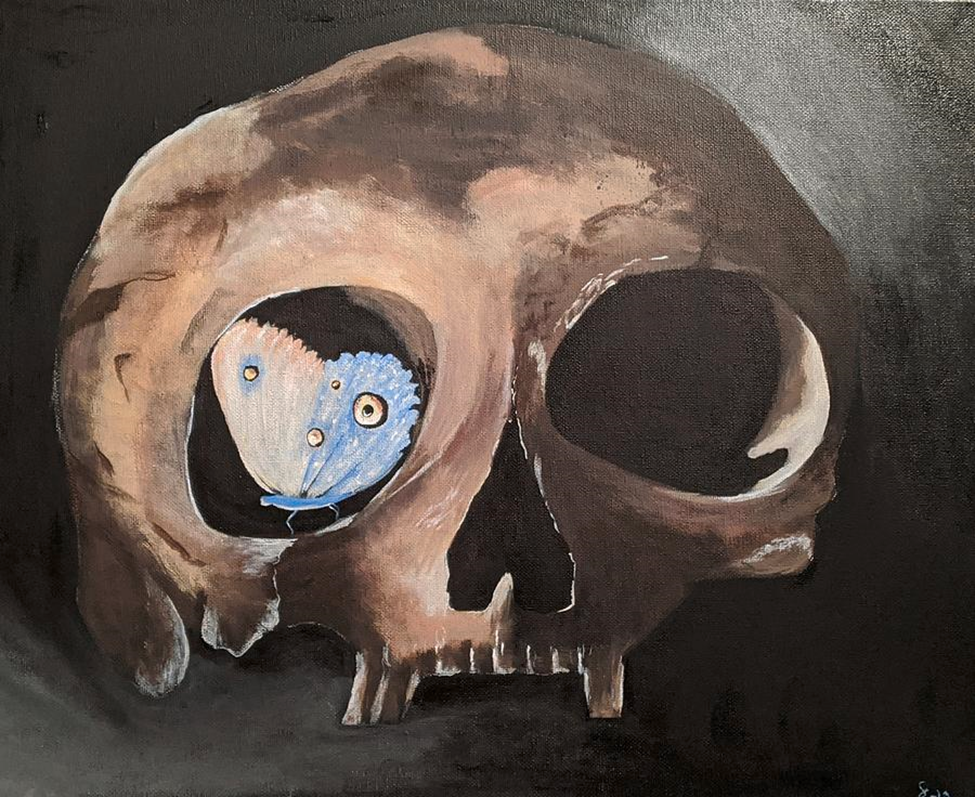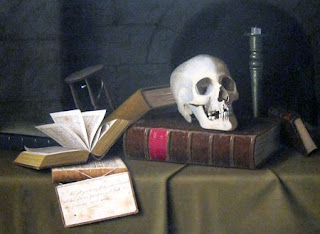Death… der Tod… la morte… la mort.
There, I’ve said it, in every language
I’ve ever studied. This is the blogpost I’ve been avoiding but perhaps need to
write. To exorcise the demon of thinking too much about death. Of not wanting
to talk about it. Not wanting to appear morbid or depressed. Not wanting to upset
friends and family.
Today, I’m one day closer to my demise
than I was 24 hours ago. And a lot closer than I was a year, or a decade, or
six decades ago. No, I don’t know the date of my death, nor do I want to know.
I could live another 30 years or I could die tomorrow. That’s true for most of
us.
I’m not religious. If asked my
religion, the answer depends on my mood and who’s asking. I may say, “Unitarian
Universalist Ethical Culturist Agnostic.” Or just “agnostic” for short. Or
Jewish (well, that’s technically not my religion,
but since my mother was Jewish I’m Jewish, even if I don’t believe in the
Abrahamic deity). Or I may reply “heathen” because that’s fairly accurate and
playfully self-deprecating. (I used to identify as “pagan” but then found out
that pagans believe in the supernatural and I don’t.) For shock value, or if
I’m irritated, I may reply “Satanist” to an impertinent query. “None of your
business” works well if I’m in a petulant mood, or slightly more politely, “Why
are you asking?”
But enough about religion – let’s talk about death. This past year, I read Neil deGrasse Tyson’s Starry Messenger: Cosmic Perspectives on Civilization; in fact, it was one of my “3 favorite reads” in 2023. Tyson tackles the subject of death, along with such similarly innocuous topics as racism, gender identity, law and order, truth, and the cosmos. When asked about God, Tyson has been quoted as saying, "I remain unconvinced by any claims anyone has ever made about the existence or the power of a divine force operating in the universe." While he concedes that he is “constantly claimed by atheists,” he is actually an agnostic.
Wait…how
did we get back to religion? Perhaps it’s impossible to wrestle with the
subject of death without speculating on the existence of the supernatural - unless one is a hard atheist, for whom the
question is settled. I cannot say that I am fully convinced that “life after
death” is utter fiction (i.e. when you’re dead, you’re dead: game over, end of
story, do not pass “GO,” do not collect $200). But it’s hard to speculate on a
literal afterlife without musing on the divine (in whatever form he/she/it
might take). Or perhaps “life after death” is real, but only metaphorically.
I’m a published author, so my novel(s) might “live on” after my own
physical death. My estate can continue to rake in the royalties (as if I were
Margaret Mitchell) long after I’ve turned to dust.
I read somewhere
that the total obliteration of one’s existence and consciousness is impossible
to imagine, at least for many of us. That may be why our ancestors invented the
concept of the supernatural, and by extension, religion. Maybe early humans’ awareness of ego led them to
construct the comforting notion that after our physical death something of us
will survive. I say humans, though perhaps other animals and even trees have a
consciousness of self, and fear of its expiration.
My own
personal death is not what I most fear. As I approach senior citizenship, I
draw closer to a time when my body may be taxed with pain and disabilities. I
fear the loss of independence, but even worse, losing friends and family. I’ve
had many losses in my life. First was a beloved great-aunt when I was in high
school, then my mother when I was 19. Other close family members and friends
have died over the decades, and I dread the losses to come, unless I’m
fortunate enough to go first.
My psyche feels unique, and I live in it 24/7. I’ve recently conceived the bizarre notion that mine is the only consciousness in existence and all other humans and sentient creatures merely props in my universe. It seemed too implausible that I happen to be alive right now, when the vast majority of the billions and billions of humans who supposedly came before me are already dead or have yet to be born. Or perhaps we are in a constant cycle of death and rebirth as Hinduism, one of our oldest extant religions, posits.
Are
these the fancies of one who has too much time to think, but not enough time with
which to occupy her hands? Perhaps I need to find a more prosaic and useful
hobby. One of the five descriptors I chose for myself on my Shepherd “favorite reads
in 2023” page is “deep thinker.” Perhaps in one sense this is not a
positive attribute. One can get weighed down by pondering too much and doing too
little. This can lead into an existential tailspin, a headache-inducing vortex of
self-absorption, and ultimately to isolation and depression. Philosophizing may
be detrimental to one’s mental health. Why spend time pondering death and the
hereafter (or lack thereof) when one has a life to live? Good advice, but not
easy to implement, especially when one is a “deep thinker.” As W.S. Gilbert’s
character Reginald Bunthorne bemoans in the comic opera Patience, “What’s the use of yearning for Elysian Fields when you
know you can’t get ‘em, and would only let ‘em out on building leases if you
had ‘em?”
On
December 24, 2023, I attended a meeting at the New
York Society for Ethical Culture, the most likely place to find me on a Sunday
morning, besides my home. As the last in-person meeting of the year, it was
designated “Remembrance Sunday.” (The December 31st
gathering was online only.) Ethical Culture, sometimes referred to as Ethical Humanism, is
a non-theistic religion that focuses on the here and now, and rarely, if ever, discusses
God or the hereafter. Though I do not know for certain, I suspect that all of its
clergy leaders are agnostics or atheists.
The meeting I attended at Ethical
Culture on December 24th was one of the most moving and intimate
that I have ever participated in. It was sparsely attended (likely because it
happened to be Christmas Eve and many members travel over holidays) but
included special music and a lovely remembrance ritual. The chairs in the room
were arranged in a concentric circles around a small table bearing a candle.
One of our clergy leaders began by reciting a poem, and then
the congregants were invited to say aloud the names of loved ones who are no
longer living, and who have impacted our lives. I invoked the names of Aunt
Rose, my mom, dad, husband and cousin, and dear friends Diana, Mary Jo and Ann.
We were invited to recognize public figures who have passed, and names such as
Martin Luther King, Jr., Nelson Mandela, Felix Adler and John Lennon were
called out. My contribution was Bishop Desmond Tutu. Pets were not excluded from our remembrances and
I shared the names of Kerry, Princess, and my dearly missed Doris, a Siamese
cat I cherished from childhood into my mid-twenties.
The candle in the center of our circle was lit, and one by one, we came forward to ignite scraps of flash paper on which were written messages to deceased loved ones. The flash paper flared for a second, then instantly vanished, as our messages were released into the universe, memorializing those we had loved and lost. This was not a magical ceremony of literal necromancy, but a symbolic, metaphoric and deeply meaningful rite of remembrance. As humanists, we were reminded that those we have loved continue to live on in our hearts and minds, and in the impact they have made.
The meeting ended with Maroon 5’s song “Memories,”
performed by the quartet (guitar, violin and two vocalists), with the
congregation singing along. I’ve heard this melody before, but never knew the lyrics.
Just before the song started, someone had distributed cups of sparkling cider to the congregation, so we could literally “Toast to the
ones here today. Toast to the ones that we lost on the way.”
The message for my deceased loved ones, which I released into the universe – symbolically or otherwise – via the candle and flash paper was: “Hope to see you again someday.”




No comments:
Post a Comment